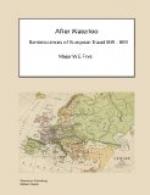The balls of the bourgeoisie of Prague are splendid and well attended. The bourgeoisie is very opulent in this city. There are but few residents Noblesse. The expences at the inns here are rather greater than those at Vienna, wine being a foreign commodity and beer the national beverage. My daily expences here for lodging, dinner, supper and breakfast amounted to four florins Convenzions Muenze, about nine franks nearly, French money. The country environing Prague is rich and abounding in corn; there are likewise hops. The walls of Prague still bear the marks made by Frederic’s shot when he blockaded Prague.
PRAGUE, 7th Sept.
To-morrow I shall start for Dresden, The diligence goes off only once a week, but I have engaged a car or rather light basket waggon drawn by two horses (a vehicle very common in Germany) to convey me to Dresden in two days and half. I am to pay for half of the waggon, and another traveller will pay for the remaining half.
Before I leave Prague I must tell you that I have found out the origin of the German phrases Jemand den Korb zu geben (to give the basket), which means a refusal of marriage. Thus when a young lady refuses an offer of marriage on the part of her admirer, the phrase is: Sie hat ihm den Korb gegeben (She has given him the basket). Hitherto I have not met with any one who could explain to me satisfactorily the origin of so singular a phrase; but on reading lately a volume of the Volksmaehrchen (Popular tales) I found not only the derivation of this phrase, but also that of the name of the city of Prague. Both are connected in the same story, and both concern the history of Prague. The story is as follows.
Libussa, Duchess of Bohemia, had three lovers, two of whom were not remarkably intelligent, but the third possessed a great deal of talent and was her favorite. She was much importuned by the rival suitors. She appeared before them one day with a basket filled with plums in her hand; and said she would give her hand in marriage to whoever of them should guess the following arithmetical riddle. She said: “One of you shall take half the plums that are in this basket, and one over: another shall take half of what remains, and one over: the third shall take half of what still remains and three over, and then all the plums will have been taken. Now tell me how many plums there are in the basket.” Her favorite was the only one who could guess the number of plums which was thirty. To him therefore she gave her hand and the plums, and to the other suitors the empty basket. Hence the phrase. The solution of the question is as follows:




